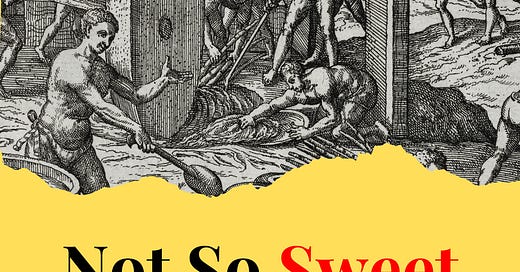Election safety...and thinking about sugar
Election/History of Sugar/Advent for the Winter Solstice
Hello!
This newsletter is coming out just as America has celebrated Halloween, many communities are celebrating Dia de Los Muertos, more and more collectives are celebrating Sawhain/Samhain, and the US elections are right around the corner.
So far as we know, it seems to be a coincidence that the Halloween/ Dia de los Muertos holidays that, in their early formations, honored the beloved dead and the turning of the seasons are now the leading edge of critically important and highly anxiety-producing elections.
In this moment, we want to highlight a few different themes.
1) Election safety. Many of our partners have been working on this!
2) Since these holidays are filled with sugar, and since sugar is so dangerous for both our ecosystems and for people's health and well being, we thought we would highlight a bit about the colonial history of sugar, which we thought you might find interesting.
3) This is also the time of year when, ecologically, we really feel it growing colder and the nights are growing longer: the winter solstice and, in the northern hemisphere, the darker time of the year is growing close. At the end of this newsletter, we are highlighting a super cool upcoming online series - "Advent for the Winter Solstice" starting at the end of November -that supports deepening into our listening of and learning alongside the animal world across faith traditions.
UPCOMING 2024 U.S. ELECTION - SAFETY
These suggestions come from our friends at Growing Roots. They drew this from their community, especially in the Tennessee region.
There is potential for violence and threats as the upcoming election approaches, particularly on November 5th, in areas where hate groups and anti-government extremists operate. Here’s the link to the Southern Poverty Law Center’s Hate Map. It should be noted that instances of hate within rural areas are often underreported.
We offer the following community-gathered safety recommendations for this election cycle. Recommendations were gathered from voters living in these areas.
Safety recommendations for local voting actions on election day:
Vote in groups! There is safety in numbers. Consider offering this option to friends who are visibly identifiable as BIPOC / LGBTQIA+
Consider wearing neutral clothing colors to reduce the chances of being a target for political groups.
If you feel you are being followed from a poll location, DO NOT HEAD HOME. It is recommended that you head to a pre-designated location AWAY from your geographic area, preferably out of town.
Plan ahead for all contingencies: Let your friends know when you’re going to vote, charge your phone, and fill your gas tank.
If you or someone you know has been convicted of a felony, it’s worth an internet search to research conditions and procedures for the restoration of voting rights.
For Tennesseans, the TN Secretary of State website hosts information on the restoration of voting rights in TN:
The American Civil Liberties Union (ACLU) Election Protection Hotline
866ourvote.org will be available on election day to report unsafe situations, intimidation fraud, etc—
1-866-687-8683
1-888-839-8682 (en Español)
1-888-274-8683 (Asian Languages)
1-844-925-5287 (Arabic)
Only if it is safe to do so, also report the incident to local election officials present. Try to get documentation that you reported it locally.
Know your rights! Here’s a helpful online resource by ACLU that outlines voting rights.
Given that this is the beginning of what is often a sugar-heavy holiday season, we thought many of you would be interested in some of the histories of sugar.
History of Sugar
Sugar's ancient origins include 8000 BCE: The domestication of sugar cane likely began with the indigenous people of New Guinea. It is not until 4,000 years later that we have evidence of sugarcane being cultivated elsewhere - in the Bengal region of the Indian subcontinent. Over 3000 years later, most likely as part of offerings to the Dark Mother Goddesses, the process of crystalizing sugar was developed. Subsequently, crystalized sugar began to be a part of Greek/Roman medicinal cultures, though it was not until the Crusades that it entered into European society as a spice, where it was often referred to as "sweet salt." The plantation process we today associate with sugar was developed first in Egypt and, many centuries later, by Europeans off the coast of Spain - and subsequently in the Americas with colonization.
Sugar became the first major plantation crop - the first true mono-crop- in the West Indies and tropical regions of the Americas - which is to say, it is the first crop wherein the violent, horrific intensity of enslaved labor was used to produce white sugar for (mostly European) consumption. Sugar subsequently played a critical role in the development of global colonial economies, industrialization, the growth of the pressure for rapid production, and the ecological destruction that we now associate with global economies. Big Sugar was amongst the first and most long-lasting lobby groups and sugar advertising (especially for chocolate) played a critical role in shaping the social idea of what is "fun" in holidays from Halloween to Christmas to Mother's Day. All the while, the obesity and chronic illnesses (such as diabetes) relating from sugar, and the intensity of ecological destruction, continue to grow.
Want to read more? here's a longer article.
A Time of Wonder
As the days shorten, join us to deepen gently into the lengthening nights and celebrate the return of the sun.
An “Advent” series for the Winter Solstice Season
5 online Sessions; 3:30 to 4:30 pm ET Dates: November 23, November 30, December 7, December 14, and December 21





